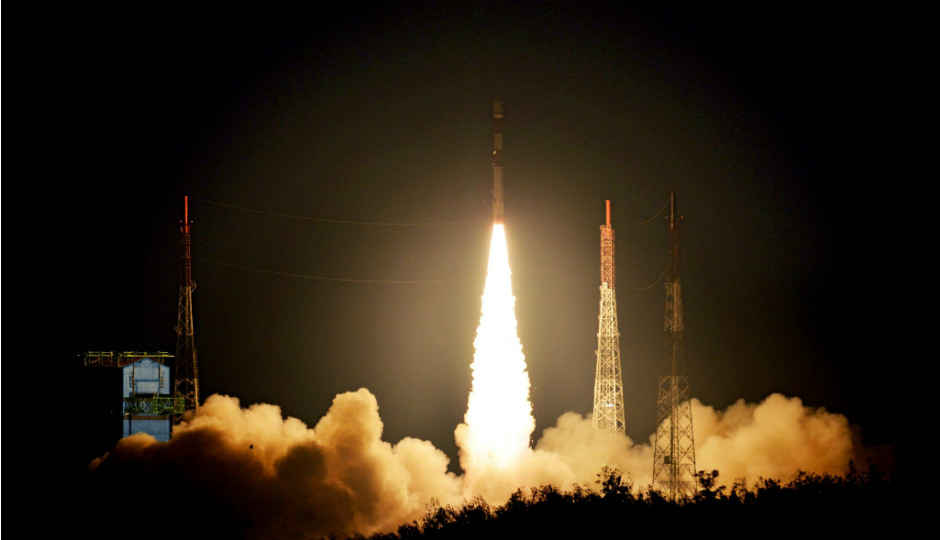ISRO successfully launches two British satellites
 The Indian Space Research Organisation (ISRO) launched its Polar Satellite Launch Vehicle, PSLV-C42, last night from the Satish Dhawan Space Centre, SHAR in Sriharikota, Andhra Pradesh. The rocket’s payload included two British satellites, NovaSAR and S1-4. Both weigh 450 kilogrammes each and are designed for observing the Earth. According to a report on the launch by The Hindu, the rocket in its core-only form (without any of the six strap-on motors, that is) ascended to the skies at 10:08 PM on September 16. Nearly 18 minutes later the two satellites were placed into orbit by ISRO. This event marks the 44th launch of the PSLV and the 12th launch of a core-only version of the PSLV. “This was a spectacular mission. We have placed the satellite in a very, very precise orbit,” commented R Hutton, the Mission Director. According to the report, the two Surrey Satellite Technology Ltd-owned satellites were placed into a circular orbit around the poles, 583 kilometres from the Earth. The launch has won the commercial arm of ISRO, Antrix Corporation over 220 crore rupees. Update #5#PSLVC42 is ready for take-off in 60-minutes from now carrying NovaSAR & S1-4 satellites from Satish Dhawan Space Centre, Sriharikota.@pmo@PIB_India @DDNational #ISROMissions#PSLV pic.twitter.com/IMCQcSmCc7 — ISRO (@isro) September 16, 2018 According to the report, the NovaSAR satellite is a technology-demonstration mission designed to test the capabilities of a new low-cost S-band SAR platform. It is planned to be used for ship navigation, along with maritime and flood monitoring. It will also have agricultural and forestry applications. “This unique mission is mainly for ‘ascending daytime node’ launch. This is the first time we have executed a different type of mission altogether,” commented K Sivan, Chairman of ISRO. According to him, ISRO has 18 planned missions for the next six months, of which 10 are satellite missions and 8 are launch vehicle missions. Amongst all these launches, ISRO also plans to launch Chandrayaan-2, India’s second moon rocket that is now long-awaited. The space agency is expecting no more delays in the launch at the moment and is aiming for the early-January-to-mid-February-window. Other future launches also include the GSAT, a Digital India effort that aims to provide internet at a speed of 100 Gbps. According to Sivan, the Cartosat and Risat satellites will also be launched in the coming months.
The Indian Space Research Organisation (ISRO) launched its Polar Satellite Launch Vehicle, PSLV-C42, last night from the Satish Dhawan Space Centre, SHAR in Sriharikota, Andhra Pradesh. The rocket’s payload included two British satellites, NovaSAR and S1-4. Both weigh 450 kilogrammes each and are designed for observing the Earth. According to a report on the launch by The Hindu, the rocket in its core-only form (without any of the six strap-on motors, that is) ascended to the skies at 10:08 PM on September 16. Nearly 18 minutes later the two satellites were placed into orbit by ISRO. This event marks the 44th launch of the PSLV and the 12th launch of a core-only version of the PSLV. “This was a spectacular mission. We have placed the satellite in a very, very precise orbit,” commented R Hutton, the Mission Director. According to the report, the two Surrey Satellite Technology Ltd-owned satellites were placed into a circular orbit around the poles, 583 kilometres from the Earth. The launch has won the commercial arm of ISRO, Antrix Corporation over 220 crore rupees. Update #5#PSLVC42 is ready for take-off in 60-minutes from now carrying NovaSAR & S1-4 satellites from Satish Dhawan Space Centre, Sriharikota.@pmo@PIB_India @DDNational #ISROMissions#PSLV pic.twitter.com/IMCQcSmCc7 — ISRO (@isro) September 16, 2018 According to the report, the NovaSAR satellite is a technology-demonstration mission designed to test the capabilities of a new low-cost S-band SAR platform. It is planned to be used for ship navigation, along with maritime and flood monitoring. It will also have agricultural and forestry applications. “This unique mission is mainly for ‘ascending daytime node’ launch. This is the first time we have executed a different type of mission altogether,” commented K Sivan, Chairman of ISRO. According to him, ISRO has 18 planned missions for the next six months, of which 10 are satellite missions and 8 are launch vehicle missions. Amongst all these launches, ISRO also plans to launch Chandrayaan-2, India’s second moon rocket that is now long-awaited. The space agency is expecting no more delays in the launch at the moment and is aiming for the early-January-to-mid-February-window. Other future launches also include the GSAT, a Digital India effort that aims to provide internet at a speed of 100 Gbps. According to Sivan, the Cartosat and Risat satellites will also be launched in the coming months.from Latest Technology News https://ift.tt/2D3grbI




Post Comment
No comments
Post a Comment